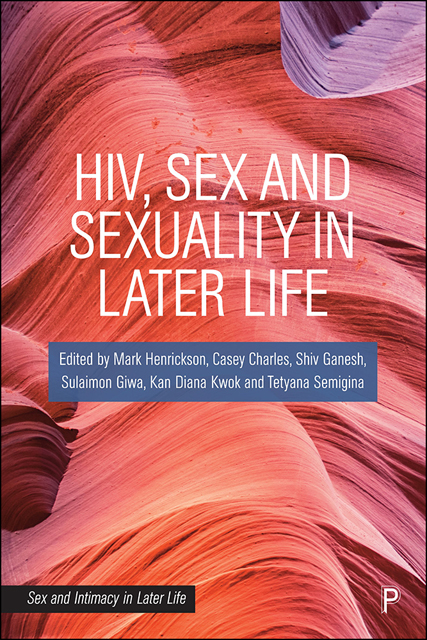4 - Chemsex among gay men living with HIV aged over 45 in England and Italy: sociality and pleasure in times of undetectability
Published online by Cambridge University Press: 16 June 2023
Summary
Introduction
‘Sometimes I end up doing it [sex under the influence of drugs] on a midweek afternoon with maybe just one bloke from Grindr, sometimes it’s ten people on a weekend … there are drugs and Viagra, you know it’s gonna be fun.’ (Ben, 55–65, Manchester)
The use of recreational drugs to enhance and facilitate sex, mostly among men who have sex with men is now commonly referred as ‘chemsex’. Despite originating in the London scene in relation to the use of GHB/GHL, often referred to as ‘G’, crystal methamphetamine, often referred to as ‘tina’ or ‘T’, and mephedrone, often referred to as ‘mcat’ in England (Stuart, 2013), the term ‘chemsex’ has now travelled well beyond the English context and is used also in contexts where other recreational drugs might be used for sex. According to social theorist Kane Race (2015, 2018), chemsex is defined not just by the use of recreational drugs (combined with sexuopharmaceuticals such as Viagra and Cialis in their patented or generic versions) during the sexual encounter, but also by what he calls the ‘infrastructures of the sexual encounter’ (2015, p 254), including 3G (the standard at the time), Wi-Fi and hook-up apps (for example, Grindr). The quotation at the beginning of this chapter, from the interview with Ben, highlights the significance of these elements in shaping the experience of chemsex.
The use of drugs for sexual pleasure within gay communities is not new. As recently argued by Florêncio (2021, p 8), ‘drugs, in some form or another, have been a part of queer culture for a very long time, and are certainly present in a lot of the 20th-and 21st-century queer cultural outputs’. For him, it is important to acknowledge the histories of sexualised drug use ‘as part of the history of a subculture’ (2021, p 10) that includes rituals of drug consumption than can be traced back to the early years of the AIDS epidemic. These histories are often removed from official documents (for example, laws, regulations) and mainstream narratives around drugs that build ‘drugs’ as the symbol of the moral decay of society and reduce any form of drug consumption to (individual) ‘weakness’ and/or ‘addiction’ (Dennis, 2019).
- Type
- Chapter
- Information
- HIV, Sex and Sexuality in Later Life , pp. 67 - 83Publisher: Bristol University PressPrint publication year: 2022



